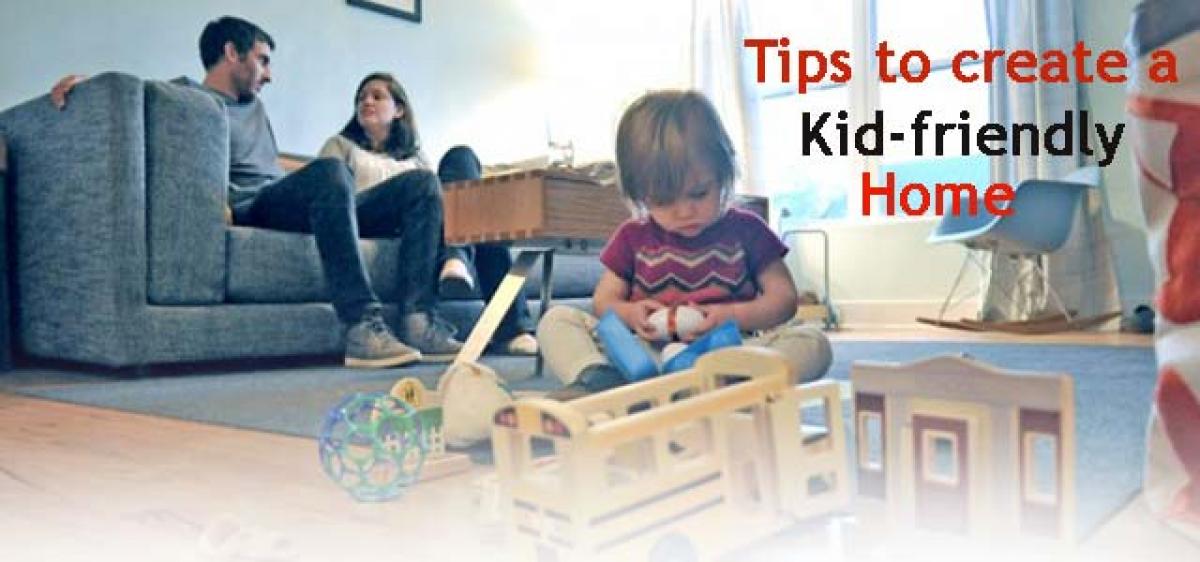Live
- Three persons admitted to hospital for diarrhea treatment
- First Star Outside Milky Way Captured: WOH G64 is 2,000 Times Larger Than the Sun
- Sikkim govt to constitute state Niti Ayog: CM Tamang
- CBI books Rajasthan narcotics inspector for Rs 3 lakh bribe
- Rajasthan bypolls: A tough contest between BJP and Congress
- Albania joins SEPA, paving way for EU integration
- Japanese government approves 250-billion USD economic package to ease price pain
- Six pharma companies to set up their units in Telangana
- The Unstable Events of a 17-Wicket Day in Perth: India vs Australia
- Dutch FM's Israel trip cancelled after Netanyahu's arrest warrant
Just In

Often as a parent of a toddler you have to think twice before you decide to spruce up your interiors with breakable show-pieces or trendy items. Your child’s safety is of utmost importance since you never know when your child swallows a dangerous shiny piece of art or injures himself.
Often as a parent of a toddler you have to think twice before you decide to spruce up your interiors with breakable show-pieces or trendy items. Your child’s safety is of utmost importance since you never know when your child swallows a dangerous shiny piece of art or injures himself.
Parents should take measures to make their home livable and safe for their little ones, especially for children who are below 2 years.
Below mentioned are some guidelines for you to create a kid-friendly home.
Tackle the window menace
Tumbling out of the window and landing straight to the emergency ward of a hospital is not uncommon. This makes it crucial to install window guards or window stops. People who have huge windows, should install safety glass or mosquito nets on the windows.
Protect them against falls
Falling from height is the leading cause of unintentional injury for kids. Be it the table, stairs, ladder, high chair or bed, falling off height and most commonly hurting their heads is a complaint parents with toddlers have. The way out is to install wall-mounted baby gates at both the top and bottom of stairs, and cushion corners and edges of tables with padding to protect your child from banging her head on them if she topples over. Also, avoid leaving your little one on bed, chair, etc, unattended. Ground is a much safer place for them to play.
Avoid allergens and irritants
Avoid smoking inside the house. Try to keep the humidity levels at a minimum by using exhaust fans in the kitchen and bathrooms. Remove any water-damaged carpet and furniture promptly. Allow a good flow of sunlight and air inside your home and open doors and windows when cleaning or painting in the house so that the pollutants do not remain in the air your baby breathes.
Prevent collisions
After falls, collisions are the most common injury among kids contributing to almost 17 per cent of all injuries. Simple household rules like ‘no running’ can go a long way in reducing the risk of collisions. Always have somebody to supervise your kids when they are playing in the home or outside in the gardens.
Lock up medicines and chemicals
That means cleaners, medications, syrups and tablets and caustic cosmetic items like nail-polish remover, perfume, bath oil, mouthwash, aftershave, and vitamins. According to studies, more than 1 million kids are poisoned by ingesting common household items every year.
Maintain electrical safety at home
Get a licensed electrician to install safety switches, which cut power off quickly to avoid electrocution and repair any open switches. Use power point covers for the switchboards so that kids don’t touch it. Replace electrical appliances and cords if they’re worn.
Protect your kids from burns and scalds
Do not allow your kid anywhere close to stoves, ovens, microwaves, heaters, hot irons etc. Hot baths and hot drinks can be one of the major reasons for scalding in kids. Hence always check the temperature of the bath water or drinks before giving it to the kids.
Be careful of strangulation and suffocation
Even the smallest of things like a phone cord could be harmful for your kid. Make sure you keep the stuffed toys or big cushions away from your child’s cot or pram. Wrap the blind cords properly and make sure they are at least 1 metre above the floor. Also, tie knots in plastic bags and keep them away from your child’s reach.
Be cautious of fire
Children, who have access to matches or lighters, can lead to many unwanted accidents. Install smoke detectors in the whole house. Check them weekly to be sure they're working, and change the batteries annually. Keep matches and lighters out of your child's reach. Put out and throw away cigarettes properly. Have an escape route planned, and practise it, in case of fire.
By: Dr Viswanath Kamoji
The writer is a Consultant Pediatric at Columbia Asia Hospital.

© 2024 Hyderabad Media House Limited/The Hans India. All rights reserved. Powered by hocalwire.com







